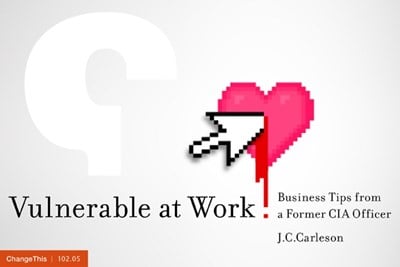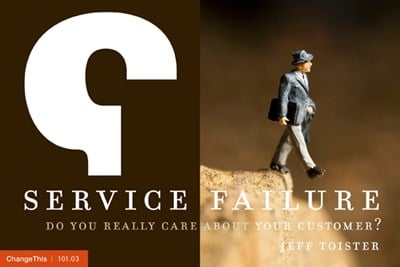
ChangeThis
ChangeThis is our weekly series of essays from today's thought leaders that are meant to evoke conversation by bringing forth new and unique ideas.
ChangeThis
-

Blog / ChangeThis
Being Vulnerable: Business Tips from a Former CIA Officer
By Porchlight
"The typical corporate environment may not be quite as fraught with danger as the realm of spies, but that doesn't negate the value of understanding the impact of emotions on decisions and performance. So, for a moment, let's loosen the ban we tend to enforce on expressing emotions in the workplace. Drop the barricade between the numbers and the feelings. Stop denying those aspects of human behavior that we, as leaders, feel we MUST deny. You can't lead if you're 'soft', right? But you also can't influence what you pretend doesn't exist. Embrace vulnerability, if only to understand why your clients are vulnerable to wooing from your competitor. To see just how vulnerable your boss is to the pressure to give the other guy the promotion, instead of you. To know how vulnerable your best employees are to job offers from other companies."
Categories: changethis
-

Blog / ChangeThis
Ninja Innovation: The Secrets of Today's Top Innovators
By Gary Shapiro
"After thirty years in the consumer electronics industry, I have seen my fair share of successes and failures. Applying our idea to the successes, we decided they exhibited characteristics of the feudal Japanese stealth warrior known as the ninja. They are all ninja innovators because they achieve their mission through a set of similar tactics; they all adhere to a code of business ethics; and they are all single-mindedly focused on winning as the only option. They are true business warriors, and here are some of their secrets ... "
Categories: changethis
-

Blog / ChangeThis
The Self-Publishing Revolution
By Guy Kawasaki
"In the old, constrained world, somebody had to select, print, and distribute what was worthy of royalty, shelf space, and killing trees. That somebody was an employee of a traditional publisher; he served as a filter, finisher, and arbiter of taste. Several thousand traditional publishers added this kind of value for hundreds of years. Shelf space for ebooks, however, is infinite, and anyone who can use a word processor can write and publish a book. These changes don't mean that books are better—no more than a democratic political system guarantees better leaders—but at least the system is more accessible."
Categories: changethis
-

Blog / ChangeThis
Making the Unconscious Conscious: How Neuroscience Can Empower (and Inspire) Marketing
By Douglas Van Praet
"If we don't understand our own preferences or the true motivations behind our own behaviors, marketers are wasting billions of dollars each year by asking questions in quantitative surveys and qualitative focus groups people simply can't know the answer to. And marketers are using that information as the guiding forces to bring innovation and improvement to the marketplace. Not surprisingly, the success rate is abysmal, as only two of every ten new products launched in the U.S. succeeds. 'Houston, we have a problem.'"
Categories: changethis
-

Blog / ChangeThis
You—According to Them: Accelerating Career Success By Understanding—and Boosting—Your Reputation
By Porchlight
"'Reputation' is not a line item we can find on a corporate income statement. But honestly, it should be. Instead it's lurking in there, living pervasively below the surface of the carefully calculated revenues and expenses. And yet, the accountants can't assign a specific number to it. Think about that for a moment. Companies can leverage the incalculable perceptions of a great reputation (their brand) into bottom-line success and a very real corporate advantage. Sadly, there's also the flip side. Companies can totally crash and burn because of negative reputations, despite solid product offerings. Perceptions may be unquantifiable, but they are infinitely powerful."
Categories: changethis
-

Blog / ChangeThis
Why It Pays to Be Likeable
By Dave Kerpen
"40 years ago a brand such as Jolly Green Giant could sell a lot of mediocre corn with a great jingle and a huge television advertising budget. 20 years ago a company such as Circuit City could be a miserable, secretive place to work but it wouldn't matter much to shareholders or customers because they likely would never find out. Social media has changed all that, very quickly. The speed and ease with which information travels—the good, the bad and the ugly—is faster than ever before, and only accelerating. Today, the brands that succeed aren't the ones that spend the most money on disruptive advertising—they're the ones that spend the most money on creating valuable, meaningful products and customer service. Today, the businesses that succeed aren't the ones who keep costs down by not giving perks to employees—they're the ones who create an open, transparent, fun place to work where passionate people can exchange ideas. Today, more than ever before, for businesses, brands, and entrepreneurs, it pays to be likeable.
Categories: changethis
-

Blog / ChangeThis
Forget Today: Start at the End
By Porchlight
"Soon after entrepreneurs and business owners start businesses, we become trapped in the day-to-day, week-to-week, and month-to-month struggles and goals of generating more sales and profits, improving employee performance, and trying to reduce our hours and stress. At some point, virtually all of us become 101% focused on these short-term goals and lose sight of our long-term visions. As a result, we begin to wander, and never achieve our initial vision. How can we find success given the daily struggles of building a company? Forget Today; Start at the End [...] In business, as in everything else, you need to have a clear vision of where you want to go. Then, and only then, can you create a plan to follow to get you there. The key is to "start at the end." Figure out where you want to go. And then you can reverse engineer the path to get there."
Categories: changethis
-

Blog / ChangeThis
Leapfrogging to Breakthroughs
By Soren Kaplan
"Surprise is the enemy. Or, is it? Could we be overlooking—even resisting—one of the most essential catalysts of personal and business breakthroughs? Could we be ignoring the most fundamental tool that anyone can use to create disruptive innovation and change? Here's the fundamental problem. Game changers—whether products, services, or new business models—don't necessarily result from big visions, carefully crafted strategies, and meticulous plans. Creating disruptive, game changing innovation requires leaders to live with uncertainty, embrace ambiguity, and respond to both good and bad surprises along the way. We've been trained to resist the very thing that's needed to leapfrog to the next level. We need to learn to live with—even embrace—what most of us view as the enemy."
Categories: changethis
-

Blog / ChangeThis
Overemphasis on Profit Erodes Your Bottom Line Why Purpose-Driven Salespeople Wildly Outperform Their Quota-Driven Counterparts
By Lisa Earle McLeod
"Most people believe that money is the primary motivator for top salespeople and that doing good by the world runs a distant second. That belief is wrong. If your sales force isn't producing what it's capable of, it may well be that you're overemphasizing profit at the expense of purpose. This observation doesn't come just from personal experience but from hard data. Studies show that companies committed to improving their customer's lives outperform the market by a stunning 15:1 ratio. [...] A quota-driven mindset spirals into the lowest common denominator sales activities. You start competing on cost not value. You think short-term, fail to understand the customer's environment, and cannot grasp the link between your products and the client's need. It's a slow descent to commodity status."
Categories: changethis
-

Blog / ChangeThis
Service Failure: Do You Really Care About Your Customer?
By Jeff Toister
"Executives may claim to care about their customers, but their actions frequently suggest just the opposite. How else could you explain hitting loyal customers with a sudden 60 percent price increase (Netflix, 2011). Would a company that cared about service really try to implement a $5 fee on debit card transactions and then defend the move as something that customers would appreciate (Bank of America, 2011). Can a company that cares about its customers really implement a procedure where pennies are literally stolen from its customers at the point of sale by rounding down the amount of change due when customers pay with cash (Chipotle, 2012). I know what you are thinking. You're different. You truly care about your customers and would never resort to price gouging or penny stealing. I hope so. And, the mere fact that you've read this far and may have even been a little indignant about a company skimping on toilet paper speaks volume about your character. Still, do you really care about customer service.
Categories: changethis
The original idea behind ChangeThis came from Seth Godin, and was built in the summer of 2004 by Amit Gupta, Catherine Hickey, Noah Weiss, Phoebe Espiritu, and Michelle Sriwongtong. In the summer of 2005, ChangeThis was turned over to 800-CEO-READ. In addition to selling and writing about books, they kept ChangeThis up and running as a standalone website for 14 years. In 2019, 800-CEO-READ became Porchlight, and we pulled ChangeThis together with the rest of our editorial content under the website you see now. We remain committed to the high-design quality and independent spirit of the original team that brought ChangeThis into the world.

